Author:
Audience Rating:
Publication:
Genre:
Character Age:
TG Elements:
TG Themes:
Other Keywords:
Permission:
| Attachment | Size |
|---|---|
| 479.26 KB |
Berlin 1945: A Story of Survival
A Short Story based on Historical People
By Maryanne Peters
It seems hard to believe with everything that happened afterwards, but in the 1920s and 1930s Germany was at the forefront of the battle for rights for homosexual and transsexual people.
The Berlin based sexologist Magnus Hirschfeld led a campaign throughout Europe with the formation of “The World League of Sexual Reform”. He toured America in 1931 with the Hearst newspaper chain dubbing him “the Einstein of Sex”. It was Hirschfeld who first outlined the full spectrum of sexual variations, by gender and orientation.
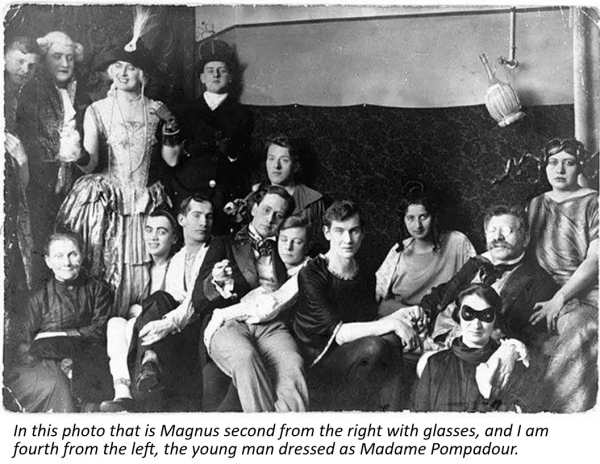
When he died in 1935 the homosexual and transsexual (he termed the phrase) communities in Berlin and elsewhere, mourned him. He was not just studying them; he was championing them. He was our champion, for I was a part of that community then.
This was Germany at the height of the Weimar Republic. It was democratic, liberal and centrist, so a target for the extremes of both left and right – The Communists to the left, and to the right the factions that were to come together as the Nazis.
Magnus was Jewish and was attacked by the Nazis from early in their history – to them he was the example of Jewish perversion and debauchery.
But they were yet to come to power, and in that prior age of laissez-faire Germany and Berlin in particular became the Mecca for homosexuals and those fascinated by the bizarre. Visitors came from Britain, Western Europe, Eastern Europe and North America. Tourism publications of the time touted Berlin nightlife. There were cabarets and nightclubs everywhere – in fact the show and movie “Cabaret” is based on this period in Berlin’s history.
One famous show was the “Tiller Girls”. Our show was a similar chorus line except we were not entirely girls – none of us was.
I worked at the “El Dorado” which was known as a transvestite venue. Even visitors commonly arrived in drag, or at least men in suits would apply a little rouge and lipstick. It was a honey pot for artists, authors, celebrities, and tourists wanting to admire a piece of “decadent” Berlin or catch a glimpse of someone famous.
Every night would start with a performance by us before rows of chairs before tables were brought out for coffee at 10:00pm. Then at 11:00pm all tables were cleared for dancing. As employees we would perform, serve coffee and be available as dance partners. It was barely a living, but there were private rooms presenting other opportunities to make money, and I had my admirers who sponsored me.
It enabled me, and a few others, to work and live in Berlin as women, which was all I had ever wanted. As soon as I could escape my little village in Pomerania I went straight to Berlin to be able to do that. I grew my hair, which was already blonde, I shaved my legs and I put on a dress, and I never wanted to go back.
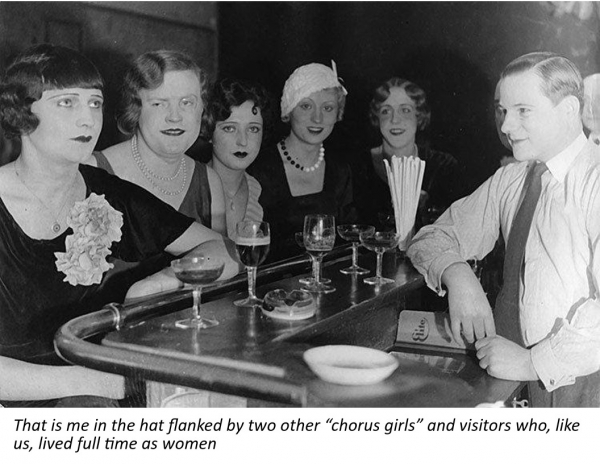
I was prepared to do anything to become female, and Magnus would help me.
At Magnus Hirschfeld’s Institute of sexology there were two doctors who he said could help me. Both of them were working with Magnus at the time, although they would soon be forced to shun him.
The first was Dr. Adolf Butenandt who was to receive a Nobel Prize for his discovery of female sex hormones. He had been able to produce progesterone from the urine of mares and was keen to see the effect of the chemical on male subjects. Magnus recommended me and I enthusiastically agreed.
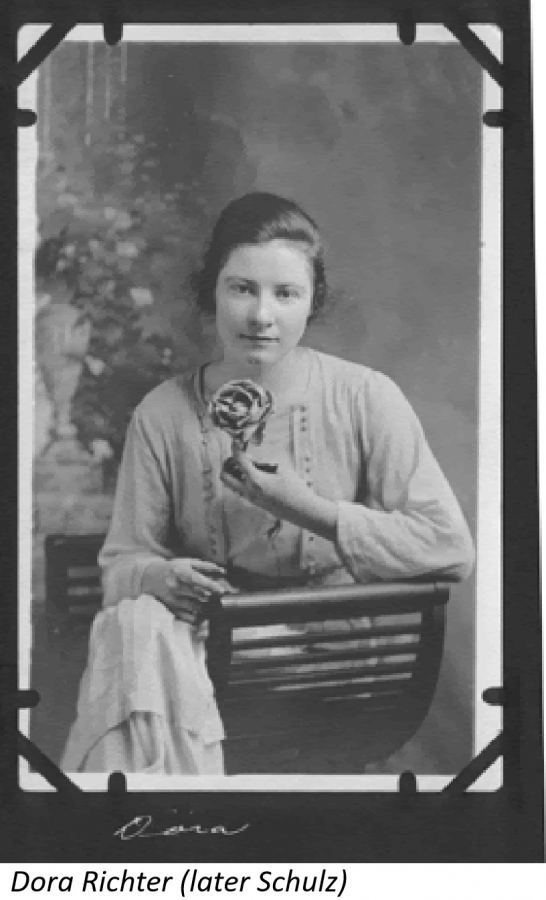
The second doctor was Dr Erwin Gohrbandt, a surgeon of some repute. Erwin had been born in a village quite close to mine, and he seemed like a very nice man. He spoke to me about surgery to give me the body of a woman. At the time he was the only person known to have performed such surgery. His first patient was working for Magnus as a maid and cleaner - her name was Dora Richter. Only the year before I met her, in 1932, Erwin had removed her penis and constructed a vagina – she had been castrated at the institute some years prior.
Dora was quiet and plain, but totally feminine and a hard worker. She was totally loyal to Magnus, but by the time I met her Magnus had been absent from Germany for some time and he was never to return. She stayed at the institute through the destruction by Nazi thugs in 1933 and was said to have died at the hands of the invaders. But as it turned out, that was not the case.
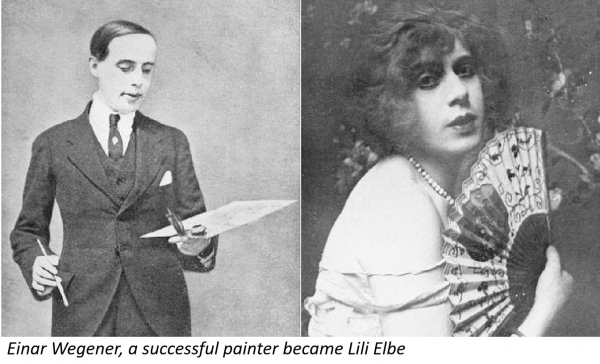
Erwin is perhaps more famous for his second sex change surgery, only a month after Dora, performed on a Danish artist named Lili Elbe. More famous only because this was a more publicized event. Sadly this surgery was not as successful, and Lily died.
But that did not put me off. Again I was a willing volunteer and submitted to surgery in March 1932.
Then in the summer of 1932 everything went up in flames. Even before the Nazis took power, the pressure imposed by them on Chancellor Franz von Papen, a Catholic conservative, was too great. He ordered a crack-down on "sexual immorality" which resulted in everybody associated with the Institute being attacked. The building itself remained open until the following year – the first year of Nazi rule. On May 6 th of that year a group of university students who belonged to the National Socialist Student League stormed the institution, shouting “Burn
Hirschfeld!”. People were attacked and said to have been killed, and books were burned. All of the years of research by Magnus and others carried out over decades, was destroyed.
I was not there. The El Dorado Club had to adapt to the new reality. I remained as a waitress. At least I was physically beyond discovery, unlike some of my colleagues.
Doctors Butenandt and Gohrbandt were not there either. Like the club, they needed to adapt to survive. Dr. Butenandt signed the “
Vow of allegiance of the Professors of the German Universities and High-Schools to Adolf Hitler and the National Socialistic State
” following the attack, and was to go on to join the Nazi party and apply himself to their evil work, as I shall explain. Erwin had been a field surgeon in the First War and something of a hero (I learned later that he had been awarded the Iron Cross First and Second Class) so in time he was called up for service in the Second War, but we stayed in touch.
10 days after the attack on the Institute Magnus Hirschfeld died in Nice, France, having learned of the destruction of his life’s work. Only those with courage attended his funeral, but there were many. The Nazis were watching. It was the beginning of a period of the systematic genocide of the homosexual and transsexual communities in Germany.
I witnessed many of the awful events of 1933. From Hitler becoming Chancellor in January, all civil liberties were gone by the end February, the first concentration was built by the end of March, all Jews were removed from professional practice by the end of April when the Gestapo was established, and eugenic sterilization was the law by the end of May. Homosexuals and similar behavior became a crime punishable by death.
Even just working at the Club had people wondering about me. I felt that as I was now no longer just dressing as a woman, perhaps it was no longer the place for me. But it was still the place where my friends were, even if it had lost much of its spark under the heel of the Gestapo boot.
It was actually Erwin Gohrbandt (who was still working in surgical research in Berlin) who suggested the solution: Join the army – the Wehrmacht. Everybody knew that joining up meant a physical examination, so if I passed that, my status was assured – I was female. Plus with the testimonial of a retired senior army officer, I could achieve a good posting
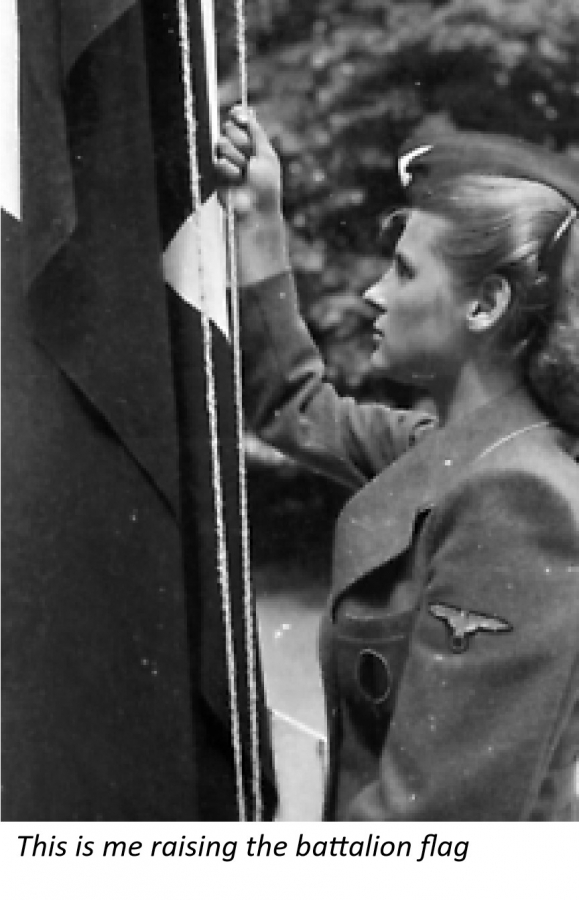
It was also a way to escape the Lebensborn program. Under the Nazi regime women should become mothers – preferably wives and mothers, but if not, just mothers. For example the SS Marriage Order of 1932 prescribed that every member should father four children, in or outside marriage. There was no room for sterile women such as I was.
By joining the Wehrmachtshelferinnen and becoming involved in training I could become indispensable and not be expected to marry and give birth. It meant that I had to follow the directives of following the hateful Nazi ideology and “to remain feminine and never to become rough warriors”.
Clerical skills were in demand, and I had none of those, but I had been in charge of a chorus line. So I quickly adapted to the role of drill sergeant for all the young women who were joining up for the first time.
Even in uniform, German society looked down on us for not being mothers. Perhaps because of my background I was used to that and I knew how to cope. I told my women to be proud to serve the Reich. Most were, but for me it was just a place to hide.
It might have been easier if I was plain like Dora, but I always wanted to be pretty and I was pleased that I was. I was not about to present myself any other way. That meant that I got plenty of attention. It also meant that I had to give myself a little. I am not ashamed. I had a vagina that functioned well enough for all but the very largest of men.
I had several proposals of marriage, which I was able to dodge by a variety of means, from trumped up incompatibility to finding fault with lineage in my desire to protect my Aryan heritage. And as a last resort I could organize a transfer and say: “For the Fatherland we must part”.
To do that I needed promotion, and I won it. When war broke out our numbers increased, as did our increasing involvement in anti-aircraft operations and civil defense. These were roles that did not require us to become “rough warriors” and at the start of the war were insignificant. The first Allied bombing of Germany was upon industrial areas in the West, where I went to learn. From August 1940 Berlin was being bombed regularly and I was in charge (only of the women) of almost 100 anti-aircraft installations.
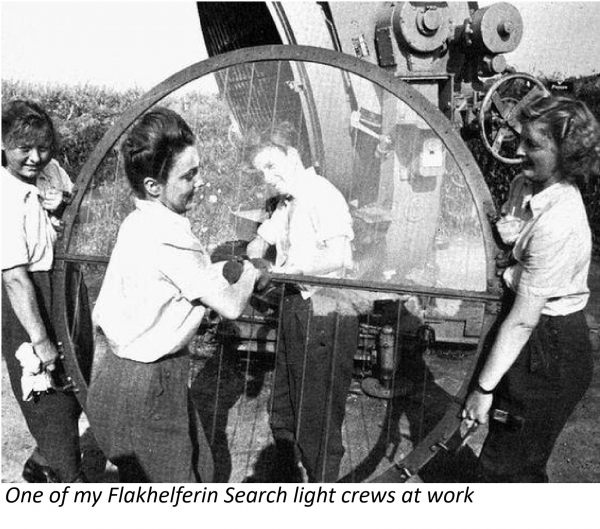
People were dying, including civilians all around me and some of my own women soldiers. Nothing can prepare you for this much horror and sorrow, but perhaps I was used to dealing with stress better than the average woman. That is what I felt I was. Nobody questioned it and I kept my secret.
One of the sites my crews were charged with protecting was the Kaiser Wilhelm Institute for Biochemistry, which was designated as being ”kriegswichtig“ – essential to the war effort. By sheer chance on a visit there I met up with Magnus’s past-friend Dr. Adolf Butenandt who was then the Director. At first, he was uncomfortable to see me because of the connection, but then he became curious to examine me as an example of the long-term effect of female hormones on a male.
I was ready to refuse, but I was curious, and I asked him to explain what he was doing. It was my condition for helping him, so he explained it to me in complete confidence, which is a confidence I kept in all the time he remained alive.
He also gave me my first shot of hormones for many years. I loved the feeling of it. I had no testicles and earlier treatment had given me some breasts tissue, but I hungered to feel as womanly as I felt with those drugs inside me. He promised to keep me supplied with enough for an ampoule every month, and that was a promise he kept.
Dr. Butenandt examined me with particular attention to my breasts and bottom, and my soft skin and hair. He asked me a number of questions about my work in the army. I don’t think that he had any idea about what the Wehrmachtshelferinnen was, but I explained that we did what we could, not fight because we could “never be rough warriors”. He seemed very excited, as he said that his research on others was inconclusive.
H e told me that he had been experimenting on others, volunteers from a place called Buchenwald. I had never heard of this town, but in my naivety I imagined it as a nice place where you could sit and read books among the trees, as the name implies. Like many Germans,
I was completely unaware of the horrors there, but I could hardly be surprised given all the friends of mine who had died at the hands of the Nazis for nothing but their gentle nature.
He told me that if it could be established that hormones could render men incapable of violence, some method of mass dosing might render the enemy passive, allowing German men to end the war by the force of their own sexuality. The idea seemed laughable to me, but Nazi fervor could make even scientists ignore logic.
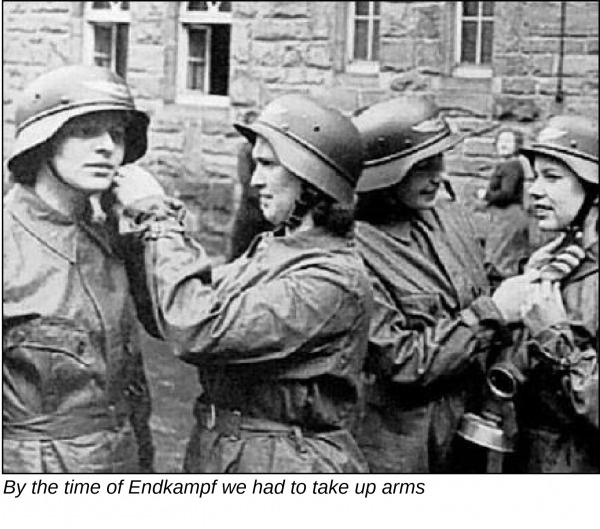
This kind of thinking marked the period in our city’s history that we call Endkampf - the final struggle. Not just weird and wonderful ideas, but the recruiting of children and the arming of the Wehrmachtshelferinnen including me.
To prove how wrong Dr Butenandt was, there were plenty of women who knew nothing but female hormones who were as blood thirsty as men, under my command. But I did my best to avoid conflict for all our sakes and led my teams west in order to surrender to the Americans rather than the Russians who seemed bent on vengeance.
And it was as a prisoner of war that I met Herb Gaffney, the man who was to become my husband and take me back to America. He called me his “Little Soldier Girl”, but the truth is I was none of those things. I never told him who I was. Records of my past life were destroyed, in any event. All he knew was that I spoke English because I was involved with tourism before the war, which led to me becoming involved in that after we married.
I had told him that I was unable to have children, and that I was under treatment from a specialist based in Berlin (Dr. Butenandt). He wanted kids so we went back to Germany in 1946 and adopted 3 German orphans. Even then things were very depressed in Germany and Berlin was slow to rebuild, whereas the USA was entering a boom time.
I never went back to Berlin after that, but before he died Dr. Butenandt wrote to me of his joy in seeing the divided city reunited after so many years, when the Berlin Wall came down. He was unable to supply me with hormones after that, but having recently lost my husband, I was ready for menopause by then
The End
© Maryanne Peters 2020
Author’s Note:
The German doctors in this story as well as Magnus Hirschfeld (and Dora and Lili), were real people. Dr Gohrbandt served as an advisory surgeon in the army and after the war was Vice President of the Berlin Red Cross. He died in 1971. Dr. Adolf Butenandt collected his Nobel Prize only after the war, but the work he did during the war remains a mystery. His institute received funding for concentrated research marked “important for the war” some of which was involved in blood chemistry for high altitude pilots, almost certainly involving concentration camp prisoners. There is some evidence of the possible use of female hormones as a weapon. He stayed with the Institute after the war (then renamed the Max Planck Society for the Advancement of Science). He died in 1995, at the age of 91.
Author's Note: So many thanks to Rose who sweated over this to present the whole story with images, for me. Just in case I attach the pdf file.
If you liked this post, you can leave a comment and/or a kudos!
Click the Thumbs Up! button below to leave the author a kudos:
And please, remember to comment, too! Thanks.



Comments
A hard story
The US in 2020 is little like Germany in 1932. Back in that time books and pamphlets might have been published with movable type. Placing one image would have been a challenge. My how technology marches on.
We have not seen enough progress since then. Medical and other technology advances but the average "man on the street" is still a bigoted misogynistic neanderthal with too much pride in his own ignorance and plenty of outlets that re-enforce his beliefs as long as he keeps buying beer.
thanks for doing the research and publishing this story.
peace.
Your friend
Crash
Oh how easily we can regress!
Yes Crash, you are right. I never thought that we would go backwards from liberal democracy so quickly, but it seems that Trumpism is even faster than Nazism.
All This and WWII
In my comment for your Chevalier d'Eon story I begged you for a story about Magnus Hirschfield and Dora (Lily Elba too, but she's always sort of overshadowed Dora in accounts of pioneering transsexual surgery, and from what little I've read about Dora I get the impression she was content to let Ms. Elba have the spotlight...) but this had a much wider scope than I could have hoped for, from the Weimar's wild cabaret scene to the sacking of Hirschfield's institute and the horrors of not just Buchenwald; but hints of her doctor friend being a monster like Mengele with his "volunteers"- a ghastly ephemism that someone might miss the implications of if they read it too quickly; And then the Reich's desperate last ditch efforts to stave off defeat by conscripting anyone with a pulse and giving them a stick to fight with...
All this in under 3000 words AND one of your patented happy endings for your narrator as some lucky GI's war bride.
Dr Hirshfield's work was such a huge milestone in trans history
I'm surprised this tale hasn't gotten more comments...
~hugs, Veronica
Some people leave a mark on this world while others leave a stain
~Eleanor Roosevelt
.
Keep your suggestions coming
Sorry if I missed your call for this story, Veronica. In fact I have had some research on Adolf Butenandt for some time which resulted in a war comic about allied POWs escaping dressed as women, but I have not been able to find and illustrator. Anybody out there who can help?
But the more I looked at him the more worried I became. As you would expect he concealed his involvement in using human guinea pigs for his high altitude studies by saying that he was only involved in the biochemistry, but he was looking at human blood samples.
As for the use of hormones as a weapon, the Nazis had some pretty strange ideas. I read a tabloid story that the British were even considering a plot to feminize Hitler!
But the title of this story is Survival. Perhaps Butenandt just signed the pledge and did his job. Our heroine joined the army and helped shoot down Allied planes, in order to survive.
I am very proud of this story, and like you I am surprised that with all the detail and issues compressed into a quick read, it hasn't got more comments. So I am doing some.
Maryanne
Illustrators!
You might want to check on Reddit, there are quite a few artists on there who might be persuaded to to take on your project.
Patrick Malloy
Survival, of a sort
Regarding the way the doctors navigated the various regime changes, one should keep in mind that at the time ethical considerations were not nearly as well established as they are today. For instance, the University of Iowa 'monster study' in 1939, designed as a controlled research on language learning, succeeded so well in inducing stuttering in selected children at an orphanage that the results were not published.
Similarly, our current knowledge on the effects of sugar on teeth comes from a research project in the Vipeholm mental health hospital in Sweden. During 1945–53, the diet of the intellectually disabled patients was controlled to the extent that about 50 had their teeth completely destroyed.
So, yes, it's not *that* hard to see how a doctor would treat a trans woman yet also do experiments on concentration camp victims. The 'greater good' and 'advancement of science' are major motivators, and much of our understanding of research ethics arose from cases like this.
Oh, by the by: one of the people whom Hirschfeld introduced to the pre-WWI Berlin queer scene was a med student by the name of Harry Benjamin. In a late interview he mentions remembering especially the Eldorado; however, by the time it was opened he had already settled in New York. The way I read it, the club featured in this story may have built on the traditions of an earlier establishment.
Eldorado
Hi Athena,
Just before this story I posted a short piece prompted by the blog "Boy, 16, given estrogen at L.A. juvenile hall... results in breasts". There is a modern story (so we are told) of doctors experimenting on unwilling subjects.
So interesting about Harry Benjamin visiting Berlin - I know he was involved in Hirschfeld's tour of the US.
Yes, the Eldorado was real and the photo of the ladies at the bar was from there.
Maryanne
Needs Must
When the choices were death or a concentration camp any alternative would suffice. It is often forgotten that Jews were not the only victims of the Nazis.
Concentration Camps
My family lived next door to a polish family and the grandmother had the tattoo number and was a survivor. She was not Jewish - just a "Slav". She was lumped in with Jews, gypsies and people classed as sexual deviants. No, Jews were certainly not the only victims.
Camps in Indonesia too...
I have Dutch-Indonesian relatives that during WW2 fled Indonesia when invaded. They scattered to New Guinea & Australia to escape. Many remained at home and were held in prison camps. Children forced to sing every morning to the Emperor. Harsh conditions, hard labor for the adults, rapes etc. Post war family gathering in the US had relatives that were 1/2 Japanese. The old folks would talk about the 'unpleasantness' that took place. War sucks.
Donna
Congratulations
I want to congratulate you on your obvious research for this story. I've previously looked up this portion of German history and I found your story to historically accurate. The twist of telling the story in a first person narrative made the otherwise somewhat dry history interesting.
I great and noble piece of work.
Hugs
Patricia
Happiness is being all dressed up and HAVING some place to go.
Semper in femineo gerunt
Ich bin ein femininer Mann
Only Tainted with Fiction
Maryanne, said she wrote this unbelievable story slathered with fiction. For those who have done the research, this lady nailed the truth, the horrors, and the survival in the years of Nazi Germany. The only thing this story is missing from real life is the foot notes where there are references to other data.
Hugs Maryanne, you have filled in so much missing data in my research in that time frame and that part of the world. Maybe I will live long enough to index and publish so others will know and understand the accomplishments and sacrifices made by others in this unique life we share.
Barb
Oklahoma born and raised cowgirl